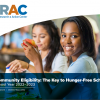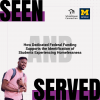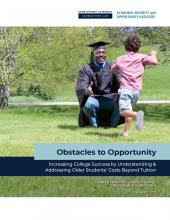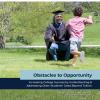0
Report
Community:
Apr 16, 2025
Despite substantial financial investments in education, millions of California students continue to struggle with reading on grade level, threatening their academic success and future opportunities. But we can change this!
Families In Schools has released a new report, Bright Spots in Los Angeles: School Districts Leading the Charge to Solve the Literacy Crisis, highlighting four school districts in Los Angeles County—Bonita Unified, Garvey Elementary, Long Beach Unified, and Los Angeles Unified—demonstrating stronger literacy outcomes for their students. By shifting to structured literacy instruction, these districts are aligning classroom instruction with reading science, setting a new benchmark for literacy success.
“This is a civil rights issue. We cannot afford to let another generation of students fall behind due to ineffective literacy instruction,” said Yolie Flores, President and CEO of Families In Schools. “We hope this report inspires districts across Los Angeles and California to pursue evidence-based literacy strategies, including those shared by districts that have led to improved literacy outcomes. Now is the time for policymakers, educators, and community leaders to unite and ensure that every child—no matter their background—has access to the fundamental right of literacy.”
Authored by: Families In Schools (FIS)
Topics: Education
 Shared by Housing Is
Shared by Housing Is
Housing Is posted a
on Apr 17, 2025
Families In Schools (FIS)
Despite substantial financial investments in education, millions of California students continue to struggle with reading on grade level, threatening their academic success and future opportunities.
0
Report
Community:
Mar 18, 2025
There are approximately 430 languages spoken in the United States, making this country one of the most linguistically rich nations in the world. This linguistic diversity is a strength. Indeed, decades of scientific research show that bilingualism is associated with a host of positive outcomes - cognitive, academic, economic, social, and health - for children and adults, for those from multilingual households and for those from monolingual English speaking households. Bilingualism is the norm and not the exception in most other nations. For example, while 92% of Europeans speak two or more languages, only 20% of Americans are bilingual. What’s worse, currently only about 8% of multilingual children receive dual language education, leaving mounds of unmet potential on the table and a lingering gap in the multilingual advantage that will likely grow, not shrink, between the United States and other nations. Consider these findings summarized in a recent report by the Century Foundation and the Children’s Equity Project.
Check out our latest reports on the benefits of bilingualism, equitable access to dual language education, and a guide for increasing high quality dual language education from the early years to the early grades.
Authored by: The Century Foundation and the Children’s Equity Project
Topics: Communications, Education, Racial inequalities
 Shared by Housing Is
Shared by Housing Is
Housing Is posted a
on Mar 18, 2025
The Century Foundation and the Children’s Equity Project
There are approximately 430 languages spoken in the United States, making this country one of the most linguistically rich nations in the world. This linguistic diversity is a strength.
0
Video
Community:
Mar 3, 2025
There is over $4.8 billion for afterschool and summer programs in California from state and federal funds. Less than 2% of that funding goes to high school students, even though research shows that older youth benefit greatly from these programs, improving students' mental health, academic performance, safety, and well-being. This video was produced, filmed, and edited by young people from the David's Harp Foundation, a youth arts mentorship program in San Diego.
Authored by: Partnership for Children and Youth
Topics: Education, School-readiness, Youth
 Shared by Housing Is
Shared by Housing Is
Housing Is posted a
on Mar 3, 2025
Partnership for Children and Youth
There is over $4.8 billion for afterschool and summer programs in California from state and federal funds.
0
Report
Community:
Mar 3, 2025
Did you know that the Expanded Learning Opportunities Program (ELO-P) can be used to employ high school students to teach and mentor elementary and middle school students in afterschool and summer programs? This brief highlights this internship model with examples from six school districts and community-based organizations in Central, Northern, and Southern California.
Paid internships for high school students are proving effective in addressing one of the biggest challenges facing California schools: the education workforce shortage. The programs also create a powerful ripple effect in communities. High schoolers gain critical job experience, earn needed income, and develop leadership skills while being inspired to pursue careers in teaching or the expanded learning workforce. Younger students simultaneously benefit from improved instructor-to-student ratios and engaging with older mentors from their community.
Authored by: Partnership for Children and Youth
Topics: Education, School-readiness
 Shared by Housing Is
Shared by Housing Is
Housing Is posted a
on Mar 3, 2025
Partnership for Children and Youth
Did you know that the Expanded Learning Opportunities Program (ELO-P) can be used to employ high school students to teach and mentor elementary and middle school students in afterschool and summer programs?
0
Video
Community:
Feb 12, 2025
Join us for this virtual Out-of-School Time Professional Learning Community convening co-sponsored with the National Summer Learning Association. This conversation is open to past members of this learning community or brand-new interested staff. Please share this invitation with colleagues as well.
Authored by: Housing Is
Topics: Early childhood, Education
 Shared by Housing Is
Shared by Housing Is
Housing Is posted a
on Feb 12, 2025
Join us for this virtual Out-of-School Time Professional Learning Community convening co-sponsored with the National Summer Learning Association. This conversation is open to past members of this learning community or brand-new interested staff.
0
Report
Community:
Jan 9, 2025
One of the most cherished founding principles of the United States, equal opportunity for all, is one that has yet to be fully realized for too many Americans. Mountains of data, most recently summarized in a consensus report of the National Academies of Sciences, Engineering, and Medicine (2023), show us the many ways that opportunity continues to be uneven and unfair, from birth, impacting historically marginalized communities. For over sixty years, born from the Civil Rights Movement, the federal government has funded local communities to build opportunity and bridge gaps in opportunity across the nation, starting with our youngest children. From Head Start to Title I and IDEA, to investments that address hunger, homelessness, and access to quality healthcare, these investments deeply impact the lives of millions of children and families in every state in the nation and contribute to healthy, safe, thriving children, families, and communities. This report outlines key programs that play a vital role in communities and families to nurture healthy child development and promote quality education and learning. We highlight research that demonstrates programs’ constructive impacts and the consequences of reducing or eliminating funding, transparency, and oversight.
Authored by: Bucher, E., Meek, S., Cardona, M., Alexander, B., Soto-Boykin, X., Catherine, E., Williams, C., Jayswal, P., Allen, R.
Topics: Advocacy, Early childhood, Education
 Shared by Housing Is
Shared by Housing Is
Housing Is posted a
on Jan 9, 2025
Bucher, E., Meek, S., Cardona, M., Alexander, B., Soto-Boykin, X., Catherine, E., Williams, C., Jayswal, P., Allen, R.
One of the most cherished founding principles of the United States, equal opportunity for all, is one that has yet to be fully realized for too many Americans.
0
Report
Community:
Jun 1, 2023
Every May, Ascend recognizes the importance of raising awareness about mental health and the multifaceted ways that it impacts family prosperity and well-being. Even as Mental Health Awareness Month comes to a close, we are committed every day to uplifting the drumbeat across our community that calls for an end to mental health stigma, making strides to ensure that families can access quality services, and advocating for policies that support families' unique mental health needs.
Join us in the national movement to raise awareness about mental health by exploring some of our new resources and sharing them with your community of changemakers!
Authored by: Ascend and the Jed Foundation for Ascend
Topics: Depression, Dual-generation, Education, Legislation & Policy, Mental health, Research
 Shared by Sandra Ware
Shared by Sandra Ware
Sandra Ware posted a
on Jun 1, 2023
Ascend and the Jed Foundation for Ascend
Every May, Ascend recognizes the importance of raising awareness about mental health and the multifaceted ways that it impacts family prosperity and well-being.
0
Report
Community:
May 1, 2023
During the 2022–2023 school year, there was a significant increase in the number of schools and districts participating in community eligibility, according to FRAC’s latest report, Community Eligibility: The Key to Hunger-Free Schools, School Year 2022–2023.
This report analyzes community eligibility adoption—nationally and for each state and the District of Columbia—in the 2022–2023 school year.
Authored by: Food Research & Action Center
Topics: Education, Food insecurity
 Shared by Camille Anoll-Hunter
Shared by Camille Anoll-Hunter
Camille Anoll-Hunter posted a
on May 24, 2023
Food Research & Action Center
During the 2022–2023 school year, there was a significant increase in the number of schools and districts participating in community eligibility, according to FRAC’s latest report, Community Eligibility: The Key to Hunger-Free Schools, School Year 2022–2023.
This report analyzes community eligibi
0
Report
Community:
Feb 17, 2023
The findings from a Syracuse University study linking universal school meal policies with improved school attendance for young students provides a strong case for expanding free school meals, according to school nutrition and attendance experts.
Authored by: Anna Merod for K-12 DIVE
Topics: Attendance, Early childhood, Education, Food insecurity, Health, Legislation & Policy, Low-income, Nutrition, Youth
 Shared by Sandra Ware
Shared by Sandra Ware
Sandra Ware posted a
on Feb 23, 2023
The findings from a Syracuse University study linking universal school meal policies with improved school attendance for young students provides a strong case for expanding free school meals, according to school nutrition and attendance experts.
0
Report
Community:
Feb 7, 2023

In the 2020-21 school year, more than 25 million children and youth – roughly half of all elementary and secondary students in the United States – attended schools in school districts that lacked dedicated funding to identify and support students experiencing homelessness. This significant funding gap increases the likelihood that many children and youth experiencing homelessness will not be identified, and even in cases where they are identified, that they will not receive the educational protections and services that can stabilize their education and their lives. Ensuring access to these supports is an important part of creating a school system that meets the needs of all our nation’s children and youth. SchoolHouse Connection and Poverty Solutions at the University of Michigan analyzed publicly-available preK-12 federal education data for the 2020-2021 school year to examine patterns that are correlated with under-identifying and inadequately supporting children and youth experiencing homelessness.
Authored by: SchoolHouse Connection and University of Michigan
Topics: Early childhood, Education, Funding, Homelessness, Low-income, Research, School-readiness, Stability, Youth
 Shared by Sandra Ware
Shared by Sandra Ware
Sandra Ware posted a
on Feb 21, 2023
SchoolHouse Connection and University of Michigan
In the 2020-21 school year, more than 25 million children and youth – roughly half of all elementary and secondary students in the United States – attended schools in school districts that lacked dedicated funding to identify and support students experiencing homelessness.
0
Report
Community:
Jun 29, 2022
Looking largely at the 2020-2021 school year, the report is chock-full of information about how schools apply research-based strategies in a variety of different contexts – from very different school systems across multiple states – to make research translate into positive experiences and outcomes for students and their teachers in three critical areas:
• Instructional work, where math or English-language-arts teams, including instructional coaches, special-education teachers, and English learner/multilingual teachers, work to improve the quality of instruction within classrooms.
• Early Warning and Response strategies, where grade-level or cross-functional teams work to create more supportive school environments, where young people are connected to adults, each other, and the school community.
• Well-Matched Postsecondary initiatives, where school-based teams of counselors, service providers, district and school leaders, teachers, and other staff band together to implement evidence-based strategies and processes that support postsecondary application, enrollment, and persistence.
At its heart, improvement is about learning. Each of these networks study their own work, and consistently and strategically make adaptations to increase their effectiveness as the organizational hub supporting schools. And they demonstrate how lessons need not fade away, but when codified, systematized, and shared, they can deepen our collective capacity to accelerate the field’s learning and growth.
Authored by:
Topics: Advocacy, Attendance, Child welfare, CLPHA, Community development, Education, Grade-level proficiency, Housing, Literacy, Low-income, Partnerships, Place-based, Supportive housing, Sustainability, Youth
 Shared by Karina George
Shared by Karina George
Karina George posted a
on Jun 29, 2022
Looking largely at the 2020-2021 school year, the report is chock-full of information about how schools apply research-based strategies in a variety of different contexts – from very different school systems across multiple states – to make research translate into positive experiences and outcomes f
0
Video
Community:
Jun 17, 2022
When public libraries and public housing authorities intentionally join forces, the benefits are real and lasting for those living in public housing. This session highlights the partnership between Cuyahoga Metropolitan Housing Authority (CMHA) and Cleveland Public Library (CPL). CMHA and CPL executive leaders will discuss how their agencies strategically aligned their vision for impact and are meeting community needs through the library’s free and accessible resources. CMHA and CPL leaders will also share strategies for creating effective cross-sector partnerships that can drive greater economic mobility and better education and
health outcomes for individuals and families.
Authored by:
Topics: Advocacy, Asset building, CLPHA, Education, Family engagement, Homelessness, Housing, Legislation & Policy, Literacy, Low-income, Supportive housing
 Shared by Karina George
Shared by Karina George
Karina George posted a
on Jun 17, 2022
When public libraries and public housing authorities intentionally join forces, the benefits are real and lasting for those living in public housing. This session highlights the partnership between Cuyahoga Metropolitan Housing Authority (CMHA) and Cleveland Public Library (CPL).
0
Video
Community:
Jun 17, 2022
Housing providers are uniquely positioned to find innovative and meaningful ways to engage residents with lived experience in program design and implementation to ensure investments are focused, efficient, and culturally appropriate. Learn how the King County Housing Authority in Washington and The Community Builders in Cincinnati, OH are responding to the needs and desires of their residents in new ways that leverage the assets and strengths of their residents to ensure that young children thrive. Attendees will leave this session with new ideas to incorporate resident input in early childhood programming to make it more effective.
Authored by:
Topics: Advocacy, CLPHA, Education, Family engagement, Housing, Low-income, Research, Supportive housing, Sustainability
 Shared by Karina George
Shared by Karina George
Karina George posted a
on Jun 17, 2022
Housing providers are uniquely positioned to find innovative and meaningful ways to engage residents with lived experience in program design and implementation to ensure investments are focused, efficient, and culturally appropriate.
0
Video
Community:
Jun 17, 2022
This panel discussion will examine the results of efforts to significantly expand the reach of HUD’s Family Self-Sufficiency Program through partnerships between the nonprofit Compass Working Capital and the Boston and Cambridge Housing Authorities. Panelists will discuss their program model and its evaluation, how they have scaled up FSS, what results they have experienced to date, and where they plan to go from here. An FSS program participant will participate in the panel and share their perspective on how the program has benefitted them.
Authored by:
Topics: Advocacy, Asset building, CLPHA, Early childhood, Education, Housing, Legislation & Policy, Research, Supportive housing
 Shared by Karina George
Shared by Karina George
Karina George posted a
on Jun 17, 2022
This panel discussion will examine the results of efforts to significantly expand the reach of HUD’s Family Self-Sufficiency Program through partnerships between the nonprofit Compass Working Capital and the Boston and Cambridge Housing Authorities.
0
Video
Community:
Jun 17, 2022
This session will review the extent to which local jurisdictions engaged with school districts in the 2016-17 Affirmatively Furthering Fair Housing (AFFH) process and preview the potential for PHAs to engage with school districts and school data in the upcoming renewal of the HUD AFFH process.
Authored by:
Topics: Advocacy, Attendance, CLPHA, Data sharing, Education, Family engagement, Housing, Legislation & Policy, Research, Sustainability
 Shared by Karina George
Shared by Karina George
Karina George posted a
on Jun 17, 2022
This session will review the extent to which local jurisdictions engaged with school districts in the 2016-17 Affirmatively Furthering Fair Housing (AFFH) process and preview the potential for PHAs to engage with school districts and school data in the upcoming renewal of the HUD AFFH process.
0
Video
Community:
Jun 17, 2022
Public and affordable housing agencies and organizations have the potential to serve as a crucial foundation for promoting early school success for economically challenged, fragile and otherwise marginalized children and families through a 24/7/365 multigenerational system of support and an ability to meet families 'where they are.' During this engaging session, Housing Is and our long-time partner The Campaign for Grade-Level Reading will elevate the critical importance of these housing-education partnerships, with special attention to the way in which such collaborations begin. This plenary will explore initial partnership development work taking place in Kansas City, MO, one of the 20 finalist communities recently announced for the 2022 All-America City Awards. The theme of this year's award is "Housing as a Platform to Promote Early School Success and Equitable Learning Recovery." Attendees have the unique opportunity to hear from a partnership in its earlier stages of development and learn alongside the speakers how critical cross-sector work can be launched.
Authored by:
Topics: Advocacy, CLPHA, Early childhood, Education, Healthy homes, Housing, Low-income, Supportive housing, Sustainability
 Shared by Karina George
Shared by Karina George
Karina George posted a
on Jun 17, 2022
Public and affordable housing agencies and organizations have the potential to serve as a crucial foundation for promoting early school success for economically challenged, fragile and otherwise marginalized children and families through a 24/7/365 multigenerational system of support and an ability
0
Webinar
Community:
Feb 8, 2022
The Housing Is team will be joined by staff from the Department of Education and Department of Housing and Urban Development to discuss evaluation considerations and best practices when evaluating multi-sector, community-based interventions such as the Promise and Choice Neighborhoods Initiatives. They will examine how they chose outcomes to track and how they set goals for the Promise and Choice Neighborhood Initiatives. They will also reflect on evaluation design considerations for these multifaceted programs.
Authored by: Housing Is
Topics: Data sharing, Education, Metrics
 Shared by Stephanie Gray
Shared by Stephanie Gray
Stephanie Gray posted a
on Apr 18, 2022
The Housing Is team will be joined by staff from the Department of Education and Department of Housing and Urban Development to discuss evaluation considerations and best practices when evaluating multi-sector, community-based interventions such as the Promise and Choice Neighborhoods Initiatives.
0
Report
Community:
Aug 18, 2021
The just-released America After 3PM special report, “STEM Learning in Afterschool on the Rise, But Barriers and Inequities Exist,” finds that afterschool programs are offering more STEM learning opportunities, but inequities exist and too many young people are missing out.
Authored by: America After 3PM
Topics: Education, Youth
 Shared by Jordan Jackson
Shared by Jordan Jackson
Jordan Jackson posted a
on Aug 19, 2021
The just-released America After 3PM special report, “STEM Learning in Afterschool on the Rise, But Barriers and Inequities Exist,” finds that afterschool programs are offering more STEM learning opportunities, but inequities exist and too many young people are missing out.
0
Interactive
Community:
Aug 3, 2021
Use this toolkit to assist in pursuing partnerships with school districts to provide afterschool and summer programs to support student recovery. Districts must spend a minimum of 20% of their funds on learning loss, which explicitly calls out summer and afterschool programs as an allowable use.
Authored by: Afterschool Alliance
Topics: Education, Funding, Out-of-school time
 Shared by Kirsten Greenwell
Shared by Kirsten Greenwell
Kirsten Greenwell posted a
on Aug 3, 2021
Use this toolkit to assist in pursuing partnerships with school districts to provide afterschool and summer programs to support student recovery.
0
Policy Brief
Community:
Jun 30, 2021
Every child in an early childhood setting should have a teacher with specialized education to promote that child’s cognitive, social, emotional, and physical development and who prepares them for success in school and in life. The National Research Council’s report from a panel of experts, Transforming the Workforce for Children Birth Through Age 8: A Unifying Foundation, lays out several recommendations for programs serving children from birth through age 8, notably that teachers "should have at a minimum a bachelor’s degree and specialization in the knowledge and competencies needed to serve as a care and education professional.
Authored by: Child Care Services Association & T.E.A.C.H.
Topics: Early childhood, Education, Post-secondary
 Shared by Kirsten Greenwell
Shared by Kirsten Greenwell
Kirsten Greenwell posted a
on Jun 30, 2021
Child Care Services Association & T.E.A.C.H.
Every child in an early childhood setting should have a teacher with specialized education to promote that child’s cognitive, social, emotional, and physical development and who prepares them for success in school and in life.
0
Publication
Community:
Jun 17, 2021
Authored by: U.S. Department of Housing and Urban Development Choice Neighborhoods
Topics: Attendance, COVID-19, Early childhood, Education, Family engagement, Housing, Low-income, Out-of-school time, Youth
 Shared by Kirsten Greenwell
Shared by Kirsten Greenwell
Kirsten Greenwell posted a
on Jun 17, 2021
U.S. Department of Housing and Urban Development Choice Neighborhoods
0
Report
Community: Postsecondary
May 20, 2021
Higher education offers millions of people the opportunity to improve their financial well-being. However, higher education is prohibitively expensive and can saddle people with insurmountable debt. Costs beyond tuition—such as housing, food, child care, and transportation—are large, essential components of the cost of attending college for students. In order to better understand how these living costs add up and vary, this report offers estimates of costs beyond tuition for older students between the ages of 25 – 45, who make up roughly one-third of college students and face unique barriers to college access and completion. The report shows that the real cost of college for older students is higher than commonly understood, examines older students’ challenges with financial aid and public benefits programs, and offers policy recommendations to address costs beyond tuition and improve college access and success for older students.
Authored by: Vincent Palacios, Casey Goldvale, Chris Geary & Laura Tatum for GEORGETOWN LAW
Topics: Attendance, Community development, Education, Housing, Post-secondary, Stability, Workforce development
 Shared by Housing Is
Shared by Housing Is
Housing Is posted a
on May 20, 2021
Vincent Palacios, Casey Goldvale, Chris Geary & Laura Tatum for GEORGETOWN LAW
Higher education offers millions of people the opportunity to improve their financial well-being. However, higher education is prohibitively expensive and can saddle people with insurmountable debt.
0
Video
Community:
May 18, 2021
As public housing authorities have worked to keep residents and staff safe from COVID-19, they have turned from focusing on emergency response to longer-term solutions. Sub-grantees from CLPHA’s partnership with the Center for Disaster Philanthropy share how they have been implementing initiatives to counter the digital divide that has only been exacerbated by the pandemic.
Authored by: CLPHA
Topics: Advocacy, Broadband, Community development, Education, Low-income
 Shared by Housing Is
Shared by Housing Is
Housing Is posted a
on May 18, 2021
As public housing authorities have worked to keep residents and staff safe from COVID-19, they have turned from focusing on emergency response to longer-term solutions.
0
Video
Community:
May 18, 2021
After over a year of remote learning, everything is out-of-school time at this point. With unknowns about vaccinations for children, communities should prepare for uneven plans across communities for summer and fall 2021. This discussion session focuses on capacity: how to support virtual and hybrid learning, how to counter learning loss, supporting parent engagement, supporting staff to support parents, providing adult socio-emotional learning, and providing connection to services. Panelists will share examples from on the ground, toolkits, and other resources, while also allowing time for small group discussion to share challenges and troubleshoot solutions.
Authored by: CLPHA
Topics: Attendance, Child welfare, Community development, Early childhood, Education, Grade-level proficiency, Out-of-school time, School-readiness, Youth
 Shared by Housing Is
Shared by Housing Is
Housing Is posted a
on May 18, 2021
After over a year of remote learning, everything is out-of-school time at this point. With unknowns about vaccinations for children, communities should prepare for uneven plans across communities for summer and fall 2021.
0
Video
Community:
May 18, 2021
Roundtable: Cross-Sector Efforts on COVID-19.
More than a year into a global pandemic, we continue to see disparities in infections, access to care, and economic supports, with an unequal burden on low-income and communities of color. This roundtable will discuss perspectives from housing, health, and policy for what we have seen and what may be to come, as well as ideas we may enact to create more permanent solutions, in addition to addressing current crises.
Authored by: CLPHA
Topics: CLPHA, Community development, COVID-19, Education, Health, Housing, Partnerships
 Shared by Housing Is
Shared by Housing Is
Housing Is posted a
on May 18, 2021
Roundtable: Cross-Sector Efforts on COVID-19.
More than a year into a global pandemic, we continue to see disparities in infections, access to care, and economic supports, with an unequal burden on low-income and communities of color.
 Shared by Housing Is
on Apr 17, 2025
Shared by Housing Is
on Apr 17, 2025
 Shared by Housing Is
on Mar 18, 2025
Shared by Housing Is
on Mar 18, 2025
 Shared by Housing Is
on Mar 3, 2025
Shared by Housing Is
on Mar 3, 2025
 Shared by Housing Is
on Mar 3, 2025
Shared by Housing Is
on Mar 3, 2025
 Shared by Housing Is
on Feb 12, 2025
Shared by Housing Is
on Feb 12, 2025
 Shared by Housing Is
on Jan 9, 2025
Shared by Housing Is
on Jan 9, 2025

 Shared by Sandra Ware
on Jun 1, 2023
Shared by Sandra Ware
on Jun 1, 2023


 Shared by Camille Anoll-Hunter
on May 24, 2023
Shared by Camille Anoll-Hunter
on May 24, 2023


 Shared by Sandra Ware
on Feb 23, 2023
Shared by Sandra Ware
on Feb 23, 2023


 Shared by Sandra Ware
on Feb 21, 2023
Shared by Sandra Ware
on Feb 21, 2023

 Shared by Karina George
on Jun 29, 2022
Shared by Karina George
on Jun 29, 2022
 Shared by Karina George
on Jun 17, 2022
Shared by Karina George
on Jun 17, 2022
 Shared by Karina George
on Jun 17, 2022
Shared by Karina George
on Jun 17, 2022
 Shared by Karina George
on Jun 17, 2022
Shared by Karina George
on Jun 17, 2022
 Shared by Karina George
on Jun 17, 2022
Shared by Karina George
on Jun 17, 2022
 Shared by Karina George
on Jun 17, 2022
Shared by Karina George
on Jun 17, 2022
 Shared by Stephanie Gray
on Apr 18, 2022
Shared by Stephanie Gray
on Apr 18, 2022
 Shared by Jordan Jackson
on Aug 19, 2021
Shared by Jordan Jackson
on Aug 19, 2021
 Shared by Kirsten Greenwell
on Aug 3, 2021
Shared by Kirsten Greenwell
on Aug 3, 2021
 Shared by Kirsten Greenwell
on Jun 30, 2021
Shared by Kirsten Greenwell
on Jun 30, 2021
 Shared by Kirsten Greenwell
on Jun 17, 2021
Shared by Kirsten Greenwell
on Jun 17, 2021

 Shared by Housing Is
on May 20, 2021
Shared by Housing Is
on May 20, 2021

 Shared by Housing Is
on May 18, 2021
Shared by Housing Is
on May 18, 2021
 Shared by Housing Is
on May 18, 2021
Shared by Housing Is
on May 18, 2021
 Shared by Housing Is
on May 18, 2021
Shared by Housing Is
on May 18, 2021



